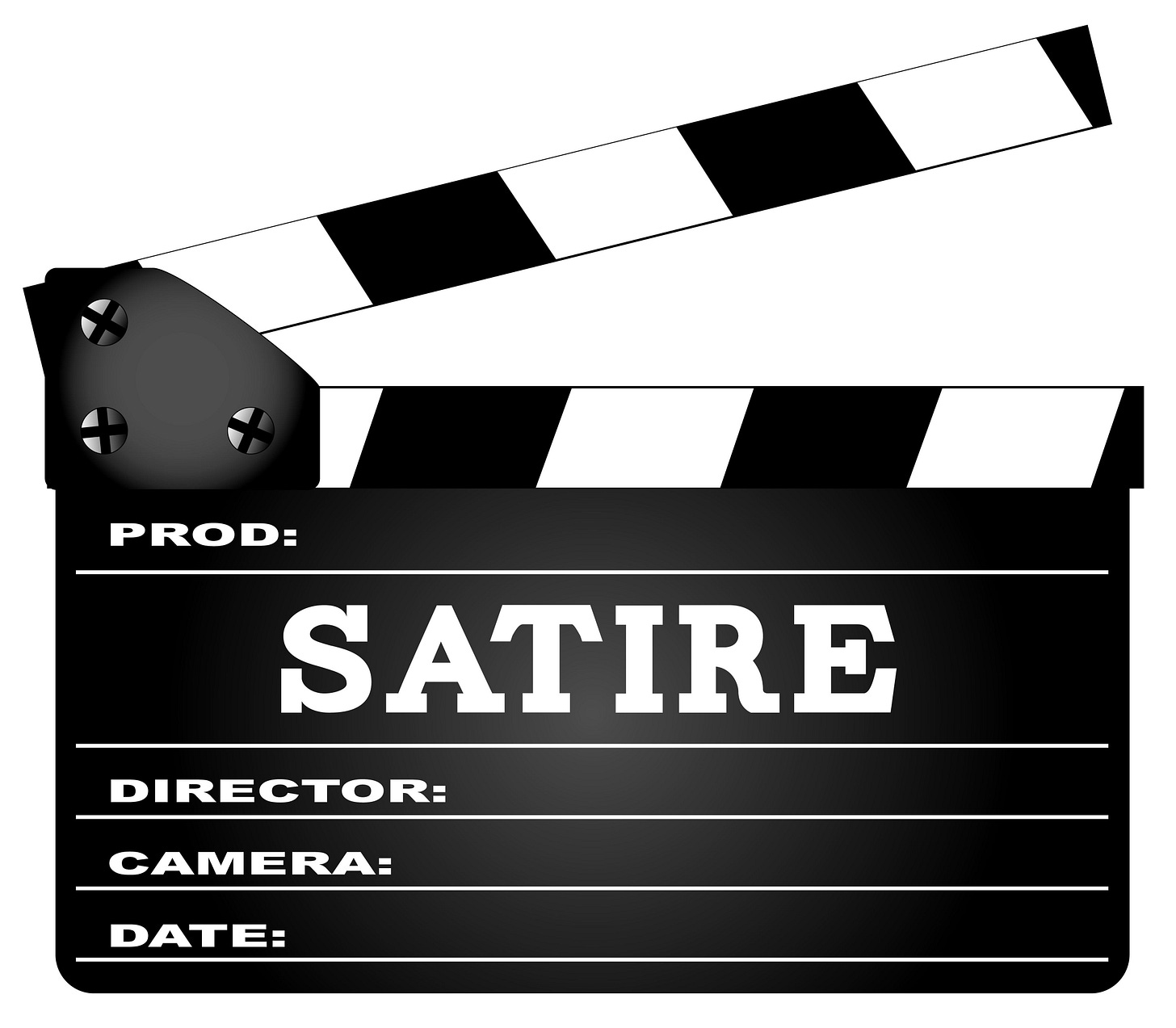E-Pluribus | August 23, 2023
When satire becomes a crime; governments co-opt the banking system to target citizens; and activism as government policy.
A round-up of the latest and best writing and musings on the rise of illiberalism in the public discourse:
Matt Taibbi: Madness: American Satirist C.J. Hopkins Sentenced in German Speech Case
From Matt Taibbi, writing at his Racket News site, comes the story of how C.J. Hopkins has run afoul of Germany’s strict laws regarding anything Nazi-related. Even though Hopkins’s work is clearly satire, he has nonetheless been threatened with jail or a fine for his “crime.”
American playwright and humorist C.J. Hopkins. . . has been sent a “punishment order” by a German judge, offering him a Sophie’s Choice of 60 days in jail or 3,600 euros.
His crime? Essentially, insulting the German health minister in a tweet, and using a scarcely-visible image of a Swastika on a mask in a book critical of the global pandemic response, The Rise of the New Normal Reich. He was first accused of this “crime” in June, shortly after Roger Waters was placed under investigation for wearing his clearly satirical “Pink” costume in a stage performance in Berlin. As I wrote when C.J. was charged weeks later, authorities claim that through the use of the mask image, C.J. was “disseminating propaganda, the contents of which are intended to further the aims of a former National Socialist organization.”
The judge in C.J.’s case has already heard free-speech argumentation from his lawyer, and this technically being a non-jury misdemeanor offense, has already ruled against those arguments. C.J. will apparently have a chance to argue for mitigation, but the decree has already been handed down[.]
[ . . . ]
The use of speech laws in this way recalls the way drug laws are applied in the U.S. We let stockbrokers blow as much coke as they want, out of the navels of exotic dancers if they like, but make possession a real crime in other contexts, effectively giving authorities a way to use an “offense” committed by many to selectively criminalize membership in certain groups, residency in certain neighborhoods, etc. As C.J. points out, the real problem is not so much with his case (although he’s certainly worried), but the now-open way in which such laws are being applied, from the prosecution of Julian Assange to the suppression of Covid speech and even the extra counts addressing “false statements” in tweets by Donald Trump.
Read the whole thing.
Daniel B. Klein: Big Brother and the Digital Dollar
“Follow the money” was popularized during Watergate as the key to uncovering government corruption. The phrase takes on new meaning in the digital age as governments become more bold about using financial systems to control and influence certain ideas and actions of their citizens, reports Daniel Klein in the Wall Street Journal.
Opponents of tyranny have long understood how governments abuse the money supply to finance their spending. But the role that transaction-based information would play in tyranny doesn’t show up in the dystopian fiction of Aldous Huxley and George Orwell or the earnest warnings of Alexis de Tocqueville, Hilaire Belloc and Friedrich Hayek.
Only more recently has it become clear how payment systems could afford a system of surveillance and “debanking” customers based on political and religious beliefs. The Chinese Communist Party has put this on display, using a social-credit system to stamp out dissent and secure its one-party rule. Bullies in Canada, the U.K. and elsewhere prove themselves quick pupils.
[ . . . ]
In 1979, Ingemar Ståhl warned about this in a satirical essay, “It Will Soon Be 1984 . . .” Ståhl, an economist and professor at Sweden’s Lund University, was active in public debate on such issues as industrial policies, rent control, defense, taxation and healthcare. Originally on the left, Ståhl’s thinking migrated toward a market approach.
[ . . . ]
Part of the ironic rationale was to ensure, as Ståhl put it, that “tax inspectors will have the opportunity to both explain and to persuade less solidaristic citizens—undoubtedly a diminishing group—of the necessity of surrendering most of their income to a society.” Too many have been “influenced by the tax-evasion propaganda from the right-wing bourgeoisie.” Thus, the proposal addresses “a sizeable problem of social justice, equity and possibly even of gender equality.”
Authorities will be able to discourage “inappropriate ‘consumption profiles’ from a social standpoint,” Ståhl writes: “In many cases, a conversation between the household and the National Board for Consumer Policies or the local municipal consumer board should be sufficient. In more deviant and problematical cases, society may have to intervene with more-intensive consumer-care measures.”
Read it all here.
Margaret Wente and Jonathan Kay: When Trans Activism Becomes Government Policy
No one should question the right of the people to petition the government or attempt to influence its decisions, but Margaret Wente and Jonathan Kay note at Quillette that activists in Canada, particularly the transgender movement, have been wildly successful in their efforts.
All radicalized social movements attract a backlash. And genderwang has proven no exception—as evidenced by the brutal reaction to CNN’s recently published Guide to Neopronouns, from ae to ze. The guide introduced CNN readers to something called “nounself pronouns,” which “use nature and other inspirations as non-binary or genderless descriptors.” (Example: “For someone who uses the nounself pronoun ‘leaf,’ that may look like: ‘I hope leaf knows how proud we are that leaf is getting to know leafself better!’”) Just a few years ago, this kind of article would have been politely ignored by mainstream readers, who were willing to dismiss this mangling of the English language as a mere campus fad. But things changed in 2022, when a biological man named Lia Thomas made a mockery of the NCAA women’s swimming championships. For the first time, it dawned on the average citizen that, yes, there are ideologues out there who actually believe (or, at least, pretend to believe) that saying “I’m a woman” acts as a sort of magic spell upon the male body.
[ . . . ]
In Canada, on the other hand, this pendulum swing back toward gender sanity still seems like it’s a long way off. Our Liberal Prime Minister, Justin Trudeau, has gone in hard for transgender boosterism—so hard that he seems to have left himself with no politically attractive way of backtracking now that the movement is losing popularity.
Gender-bending spectacles and hashtags have become a big part of the Liberal effort to siphon young progressives from Canada’s (even more left-of-centre) New Democratic Party. And so one regularly hears Trudeau’s cabinet ministers babbling about “heteronormative and cis-normative” boogeymen, much in the style of academics at a gender symposium or bouncy-headed progressive tiktokkers. This past June, some of these ministers even hosted an all-ages drag-queen show on Parliament Hill to showcase their rainbow allyship.
In 2022, Trudeau’s government announced something called a “federal 2SLGBTQI+ action plan,” which was described as “a whole-of-government approach to achieve a future where everyone in Canada is truly free to be who they are and love who they love.” This would be unobjectionable—admirable, in fact—if it weren’t obvious that such rhetoric now embeds a coded demand that men should be allowed free access to women’s locker rooms, sports leagues, rape-crisis shelters, and prison cells. Trudeau, who has traditionally marketed himself as a feminist, seems fine with men invading all of these spaces.
Read it all.
Around Twitter
Below is part of a longer Richard Dawkins tweet (can we still call them that?) about the corruption of language and how it stifles debate:
Here’s part of a thread from Mark Shellenberger with a report out of Australia on how Facebook’s “fact checkers” put their thumbs on the scale:
And finally, via Zaid Jilani, “Rich Men North of Richmond” singer Oliver Anthony refuses to be pigeonholed (click for video):









